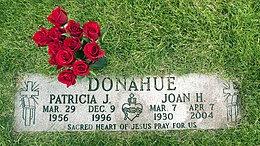Patty Donahue
Patty Donahue | |
|---|---|
 Patty Donahue onstage, 1982 | |
| Background information | |
| Birth name | Patricia Jean Donahue |
| Born | March 29, 1956 |
| Origin | Akron, Ohio, U.S. |
| Died | December 9, 1996 (aged 40) New York, New York, U.S. |
| Genres | New wave |
| Instrument | Vocals |
| Years active | 1978–1996 |
Patricia Jean Donahue (March 29, 1956 – December 9, 1996) was the lead singer of the 1980s new wave group the Waitresses. She is best known for the band’s singles "I Know What Boys Like" and "Christmas Wrapping."
Early life
Patricia Jean Donahue was born on March 29, 1956 in Akron, Ohio.[1][2] Her parents divorced when she was two years old, and she told an interviewer that her mother raised her to be an independent woman.[3]
Like her mother and sister, Donahue attended St. Joseph Academy in Cleveland.[3] She studied at Ohio State University but had to drop out for financial reasons, and tried to finish at Cleveland State University but left there too, dissatisfied with the school.[3] She eventually graduated from Kent State University.[4] In her early 20s, prior to singing with the band, she did work as a waitress.[4]
Music career
Donahue met Chris Butler while at Kent State.[3] Butler was in the art rock band Tin Huey but he had written a number of songs that were not used in their repertoire.[3] As he later explained in the liner notes of The Best of the Waitresses (1990), he met Donahue in a barroom challenge: "One day I write this song, and then it's noon and the liquid lunchers are packed into a ... bar. I stand on a chair and bang a beer bottle for attention and declare: 'I need a chanteuse to coo a tune. The song is funny and stupid and cool and different, and is anybody interested?' A voice in the back says 'uh-huh.' It's Patty."[5]
Donahue was counted among the new breed of performers who developed a new standard for women in rock music during the new wave era.[6] Although Chris Butler was the leader and songwriter, fans and music journalists often singled out Donahue as the band's primary asset. Butler wrote the lyrics but, as Rolling Stone asserted, "Donahue is no pop-band puppet".[4] She rejected the notion that she was simply singing another person's words: "I'm relating my experiences too" she told an interviewer; "He wrote the songs, but I'm not just singing what he feels".[4] Syndicated music columnist Hugh Wyatt considered her an exceptional artist despite her lack of formal training, calling her "one of only a handful of rock singers who has truly harnessed the attitudinal approach of post-punk".[7]
During the recording of the second and final Waitresses' album Bruiseology, Donahue left the band and was replaced temporarily by Holly Beth Vincent before Donahue rejoined soon afterward.[8] Donahue was sought personally by Alice Cooper to duet with him on the single "I Like Girls". He exuberantly told an interviewer: "I'd be driving in the car ... and every time I'd want to turn up the radio, it was Patty Donahue."[9] "I Like Girls" appears on Cooper's album Zipper Catches Skin with Donahue credited for "vocals and sarcasm".[10]
Soon Donahue stepped away from performance altogether. She took work as a talent scout for MCA Publishing, and later became an A&R rep for MCA Records.[11]
Death

On December 9, 1996, Donahue, who had been a heavy smoker most of her adult life, died of lung cancer in New York at the age of 40.[1][2] Donahue was interred in the Holy Cross Cemetery in Brook Park, a suburb of Cleveland.[1]
References
- ^ a b c Wilson, Scott (2016). Resting Places: The Burial Sites of More Than 14,000 Famous Persons (3 ed.). Jefferson, North Carolina: McFarland. p. 201. ISBN 9780786479924.
- ^ a b Simmonds, Jeremy (2012). The Encyclopedia of Dead Rock Stars: Heroin, Handguns, and Ham Sandwiches. Chicago: Chicago Review Press. p. 361. ISBN 9781613744789.
- ^ a b c d e Righi, Len (July 7, 1982). "Head Waitress talks about her on-the-job training". The Morning Call. Allentown, Pennsylvania. p. D11. Archived from the original on June 20, 2019 – via Newspapers.com.

- ^ a b c d Fricke, David (May 6, 1982). "Waitresses Finally Get Some Tips". Wisconsin State Journal. Madison, Wisconsin. Rolling Stone. p. 61. Archived from the original on April 7, 2019. Retrieved April 4, 2019 – via Newspapers.com.

- ^ Allen, Craig (December 6, 2014). "Craig Allen Says: Meet the Waitresses". NJ1015.com. WKXW. Retrieved June 21, 2019.
- ^ Harrington, Richard (May 15, 1982). "'Girl Groups' Take On Rock". The Pantagraph. Bloomington, Illinois. The Washington Post. p. 53. Archived from the original on July 12, 2019 – via Newspapers.com.

- ^ Wyatt, Hugh (June 10, 1983). "Waiting on new Waitresses". New York Daily News. p. F18. Archived from the original on June 18, 2019 – via Newspapers.com.

- ^ Talevski, Nick (2007). Knocking on Heaven's Door: Rock Obituaries. Omnibus Press. p. 137. ISBN 978-1-84609-091-2.
- ^ Goldstein, Toby (March 1983). "Alice Cooper Jokers Wild". Hit Parader. pp. 28–29.
- ^ Zipper Catches Skin (CD reissue) (Liner notes). Alice Cooper. Collectors' Choice Music. 2009. CCM-2079.
{{cite AV media notes}}: CS1 maint: others in cite AV media (notes) (link) - ^ Gensler, Andy (September 16, 2016). "When Quitting Pays Off: David Gray Talks Leaving His Music Behind to Build Up Shawn Mendes, DNCE & Other Hitmakers". Billboard.com. Retrieved June 19, 2019.
